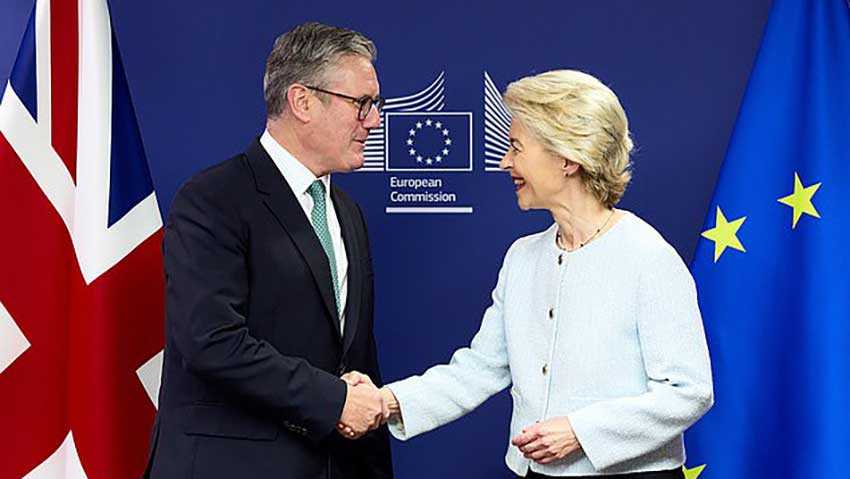Businesses grappling with rising energy costs could see higher bills under Labour leader Sir Keir Starmer’s proposal to link the UK’s emissions policy with the European Union’s carbon pricing scheme.
Critics—including Tory MPs, leading Brexiteers, and energy analysts—warn that adopting stricter EU rules could inflate manufacturing and power-generation expenses, potentially passing higher costs on to consumers.
Starmer is in Brussels this week, five years after Brexit, aiming for what he calls a “reset” of the UK-EU relationship. While he is also seeking new defence and security agreements, attention has zeroed in on his plans for “full dynamic alignment” with EU carbon trading rules—an approach that could reignite suspicions Labour intends to reverse parts of the Brexit settlement.
‘no sense to lock into eu net zero policy,’ say critics
Former Brexit negotiator Lord Frost condemned any shift towards the EU scheme, calling it “even more expensive” and urging ministers to reduce, not tighten, net-zero measures. Jacob Rees-Mogg, former business secretary, labelled emissions trading schemes “a means of making energy more expensive,” advising they “should be abolished.” Andrew Griffith, the Conservative business spokesman, likewise argued that joining the EU’s system “will add more costs to businesses and consumers.”
Britain’s standalone carbon trading market, introduced after leaving the EU, has seen the cost of a carbon allowance hover around £35 a tonne, compared with the EU’s £70 a tonne. Yet this gap has begun to narrow, with prices rising above £45 in the UK after news of Starmer’s proposals, prompting concerns of mounting pressure on energy-intensive industries.
Under carbon trading rules, companies must buy permits if they emit above a certain threshold. If the UK formally re-links with the EU scheme, analysts suggest the combined cost to industry could run into billions of pounds each year. Utility policy expert Steve Loftus estimates the total annual impact could reach £3.7 billion, with higher industrial electricity prices likely feeding through to household bills.
Independent energy consultant Kathryn Porter said any alignment “will make carbon emissions more expensive,” leading to a general uptick in the cost of producing goods from fossil fuels—a move she views as “very inflationary.”
Some major industries, including steelmakers and power generators, support Labour’s plan despite potential short-term cost rises. By reintegrating with the EU carbon system, they hope to sidestep a coming Carbon Border Adjustment Mechanism (CBAM)—effectively a carbon tariff on energy-intensive imports—that could far exceed the expense of higher carbon prices.
A government spokesman noted that the current UK-EU Trade and Cooperation Agreement permits consideration of linking carbon pricing schemes. Starmer has repeatedly said his priority is “making Brexit work better” rather than rejoining the EU, but his critics insist that deeper alignment with Brussels risks diluting British regulatory independence and piling new costs onto struggling businesses.

